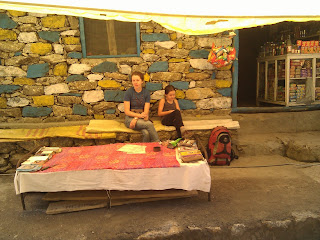We made it. After an epic seventeen-hour flight from Dubai to Los Angeles, we arrived in the United States of America last Monday. The country was obsessed with the question of whether Congress would raise the debt ceiling, but we, the newly repatriated, were interested in much more pedestrian things. For example drinking water. Thanks to the ineptitude of United Airlines, we missed our connection to San Francisco and got bumped to a flight the next day. Luckily LA is the best place in the world for us to be stranded, because my family lives nearby. So we took a cab to my parents' house and then, because they were not home, promptly stretched out on the sidewalk. Why the sidewalk? Well, for one thing, because nobody was stretched out there already. Also because there were no stray dogs. And because it looked clean. After a few lazy, jetlagged moments on the concrete, I realized I was thirsty and began to wish I had purchased a bottle of water before we left the airport. But then I remembered! I leapt up, uncoiled my parents' garden hose, and shot long blasts into my mouth. Jessica did the same. Violet thought we were crazy.
I don't know how long it will be before I get used to drinking from the tap. Every night when we run our toothbrushes under the faucet, it feels a little naughty. I think Violet and Jessica feel this way about wearing tank tops too. That is, they would feel that way about tank tops, if it weren't so damn cold here! Apologies to any readers suffering heatstroke in the middle part of the country, but here in the San Francisco area, it is about 75 in the sun and 60 in the shade. In August. I am reminded of the time Jessica said, shortly after we arrived in India, that she realized she had been cold and sleep-deprived for the last four years (ie, since we moved to Northern California). I feel bad bringing her back here, but--did I mention you can drink from garden hoses?
Taking care of various chores over the past week (utilities, groceries, auto maintenance, etc.) I have had a realization of my own. Although our life was on the surface much easier in India--because we had servants to iron our clothes, drive us to and fro, cook our food, and so forth--in fact life was more difficult there. Say you want to buy a bag of pasta. You have to call the driver and wait half an hour for him to pick you up. Want a visa extension? Good luck with that. There is just more friction in daily life over there. Part of this is contextual--friction caused because I was a foreigner--but most of it is cultural. Indians don't think much of efficiency. In fact many of them believe (wisely, I think) that decreasing the number and duration of face to face interactions is not necessarily a good thing. My colleagues at the university in Hyderabad, for example, understand that a good portion of each day will be spent in perfunctory conversation with peers. To an American observer, this is wasted time. To an Indian it is a job requirement. And not a bad one, either. Want to get a chai?
Of course, this is not to say I miss the Foreigner's Registration Office. Jessica and I made one last stand there on the day before we left, begging for permission to leave the country one day later than her residency permit prescribed. I have grown accustomed over the years to Jessica waltzing effortlessly, thanks to her superior negotiating skills, into outcomes I could only dream of achieving, and that is exactly what happened: we were out of there by two pm, exit stamp in hand.
Of course, this being India, the guy at the immigration desk at the airport didn't even ask to see our paperwork, so we might as well have let everything expire.
Most of my re-entry observations have been the ones I expected--the miracle of clean water, lack of litter, quantity of white people, girth of those white people--but there have been some surprises as well. One is the friendliness of the average American. From the customs officers at the airport to the guy who smog-checked my car, we have been met by nothing but smiles and helping hands since we arrived. Maybe these people were all holding knives under the table, but it seems to me that Americans are a friendly bunch of people.
Another surprise is the almost baroque silliness of the American upper class. This past weekend we went down to Carmel, a town of rich dog-lovers and probably rich dogs (a la Leona Helmsley). I can't tell you how many times I wanted to stop someone--invariably a white woman between the ages of fifty and seventy, with eerily glossy skin, leading a flock of tiny poodles by a cat's cradle of leashes--and say, "In India, there are people living like dogs!" But I was afraid she would turn it around on me and say, "Yes dear, but in Carmel, there are dogs living like people."
And what do you say to that?

















































